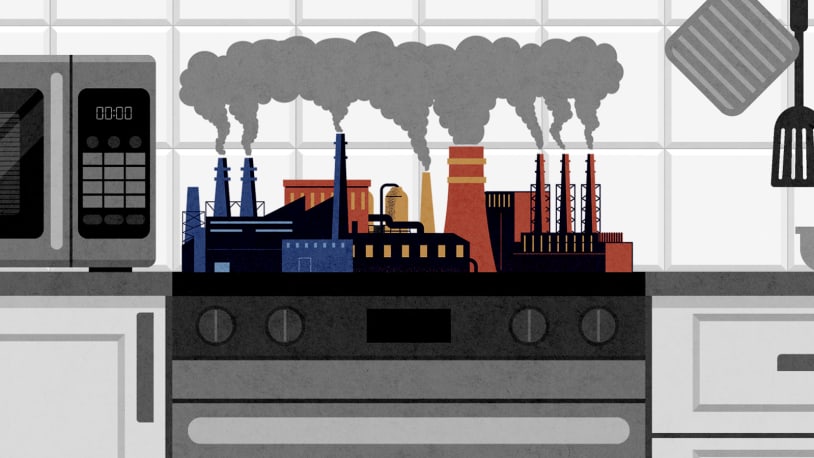
Should gas stoves be banned?
Should gas stoves be banned? That may happen soon in the United States. The Consumer Protection Safety Commission wants to take action following new research that links gas stoves to childhood asthma, Bloomberg reports. “Any option is on the table,” Richard Trumka Jr., a member of the commission, told the news service. “Products that can’t be made safe can be banned.”
The move could shake up kitchens across the country. “A ban on gas cooking appliances would remove an affordable and preferred technology used in more than 40 percent” of American households, an appliance industry spokesperson says. Are gas stoves about to become extinct, or can they become safe to use? Here’s everything you need to know:
What’s wrong with gas stoves?
It’s a health issue. Consumer Reports points out that some gas ranges emit nitrogen oxides at high and even unsafe levels. That’s a problem for people — especially kids — who live in a household where cooking is done over a gas-fueled flame. “The gases can worsen asthma and other lung diseases, and may increase the risk of asthma in children.” Pollutants are an issue even when a family isn’t cooking, Scientific American adds. While combustion produces toxins that “can irritate the lungs,” one recent study suggests “more than three-quarters of methane that escapes from a stove does so when it is not in use.”
Are there climate issues with gas stoves?
There’s that too. “Cooking over a natural gas flame is probably the most intimate connection with climate change that we never think about,” says Harvard’s Drew Michanowicz. That same study that demonstrated unused gas stoves are leaking methane also found that those emissions “are roughly equivalent to the carbon dioxide released by half a million gas-powered cars in a year,” Smithsonian Magazine reports. For some observers, gas stoves are a climate problem because they block a broader shift to renewable energy. “A kitchen with a gas stove requires gas lines in buildings and under streets—a whole infrastructure that can prevent residential areas from switching over to renewable-power grids,” Sabrina Imbler wrote for The Atlantic in 2020.
Are there ways to reduce emissions without banning stoves?
There are certainly ways to improve indoor air quality in homes that have gas ranges. Harvard Health recommends using air purifiers and opening your windows when you cook — though it also suggests switching to electric appliances. “The EPA suggests using an exhaust fan above your gas stove that’s vented to the outdoors,” NPR reports. At least one state has moved to turn that suggestion into a requirement: California has approved standards to require extra ventilation in homes that have gas stoves, with even stricter requirements for smaller households “because pollutants reach unhealthy levels faster.”
Aren’t cities already taking action?
Yes. “Los Angeles, Seattle, New York, and other progressive cities have already moved to ban most gas appliances in any new homes or apartments,” Nexstar Media reports via The Hill. But that’s turned gas stoves into another front in America’s culture wars, Smithsonian notes: “Pushback from the natural gas industry has caused other states like Florida, Pennsylvania, and Texas to preemptively pass laws to stop cities from banning gas in new appliances.” In fact, 21 states have passed such preemption laws.
There are objections to a ban, right?
Of course. Wirecutter suggests that the climate focus on stoves might be overblown because gas cooking “represents a tiny part of household energy use and carbon emissions.” Stoves amount to around 3 percent of household natural gas use — but water heaters come in at 29 percent, and home heating at 69 percent.
And gas ranges are popular among foodies. The Washington Post reports that 90 percent of professional chefs cook with gas. “With gas, you can control the flame, and it’s easy to get the temperature you need, which has made it a preferred choice for those who consider themselves to be serious cooks.” That’s a potentially powerful base of political opposition to a ban.
There are also some folks who think that a crackdown on gas stoves would amount to serious government overreach:
What’s next?
A fight, most likely. Nexstar Media points out that gas companies are funding an ad campaign reminding homeowners that stoves are “the gas appliance most often highlighted as desirable in real estate listings.”
Even if a ban happens, it might not happen soon: There’s a lengthy process for the Consumer Product Safety Commission to go through, starting with public comment — likely to occur “later this winter.” And Bloomberg notes that a ban isn’t the only option. The commission could instead decide to impose emissions standards on new stoves and let the industry figure out how to get there.
Americans might decide to ditch their gas stoves anyway, CNN points out: The recent Inflation Reduction Act offers rebates to households that convert to electric stoves and other, non-gas appliances.
Should gas stoves be banned? That may happen soon in the United States. The Consumer Protection Safety Commission wants to take action following new research that links gas stoves to childhood asthma, Bloomberg reports. “Any option is on the table,” Richard Trumka Jr., a member of the commission, told the news service. “Products that can’t…
Should gas stoves be banned? That may happen soon in the United States. The Consumer Protection Safety Commission wants to take action following new research that links gas stoves to childhood asthma, Bloomberg reports. “Any option is on the table,” Richard Trumka Jr., a member of the commission, told the news service. “Products that can’t…